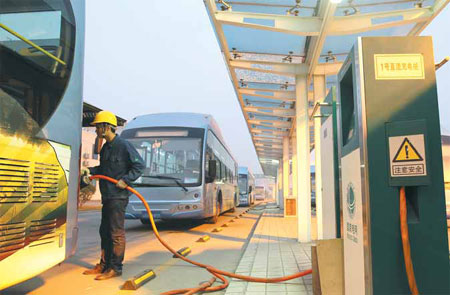Low charge in new-energy initiative
|
Electric buses line up at a charging station in Linyi, Shandong province. Despite a range of practical difficulties, both automakers and policymakers plan strong support for new-energy vehicles. Zhu Wutao / for China Daily |
Few on the road and a shortage of facilities
Despite strong government support for new-energy vehicles, fewer than 20,000 have been sold over the past two years, according the latest figures from the Ministry of Science and Technology.
A major cause for low sales is the nation's scarcity of electric charging facilities, say industry experts. In Beijing, a map of the capital's stations shows the city now has just 14 in operation, most of them in the suburbs outside the Fifth Ring Road.
They mostly service electric buses, with just a few designed to accommodate privately owned cars.
At a station near the Third Ring Road, 21 charging stalls now sit half finished.
Staff working at a nearby parking lot said construction on the station began at the beginning of last year, but work gradually slowed to a halt.
Beijing Electric Power Co, an affiliate of the country's electricity monopoly State Grid, is the main builder of the city's electric vehicle charging stations.
The company said it built 60 charging stations with 1,080 charging stalls by the end of 2012, but few are now operational.
But a plan by the Beijing municipal government calls for 256 stations and 42,000 charging stalls by the end of 2015.
According to Xu Heyi, president of BAIC Motor Corp, the local governments of some densely populated cities are now promoting pure electrics and plug-in hybrids to ease increasing environmental pressures.
But he said it has proven very difficult for businesses to get land for charging facilities in high-density cities.
"Parking is already a problem, let alone building new charging stations," he said.
In response, new-energy proponents say the facilities should built in residential communities, but Xu said that also faces challenges.
"For one thing, (an additional heavy) load on the community electric network is a big problem," he said.
"Also standards for charging equipment and vehicles are not unified. Different brands may have different specifications. The industry has had different voices on this for a long time."
Strong support
Despite the practical difficulties, both automakers and policymakers are giving strong support to new-energy vehicles.
Xu said delegates to the National People's Congress in March agreed that electric vehicles are a major solution to the current environmental problems in Beijing and other big cities.
The Beijing government recently drafted a new policy to support new-energy vehicles that exempts electric cars from the license plate lottery and offers a combined subsidy of up to 120,000 yuan ($19,308) from the central and municipal governments, said Chen Guiru, deputy director of Beijing New-Energy Vehicle Development Promotion Center.
He said detailed implementation measures for the new policy will be released in May.
Similar incentives were adopted by the Shanghai municipal government at the end of last year. The government will give a subsidy of up to 30,000 yuan for each plug-in hybrid and up to 40,000 yuan for a privately owned pure electric vehicle.
Last July, the local governments of Shenzhen and Hefei both began policies to support new-energy vehicles.
Statistics from the Ministry of Science and Technology showed that 25 pilot cities for new-energy vehicles now have 27,400 on the road, but 23,000 are used for public services including buses and taxis.
The central government has set a goal of 500,000 new energy vehicles sold by 2015. To meet the target, another 470,000 would have to be sold in less than three years.

























